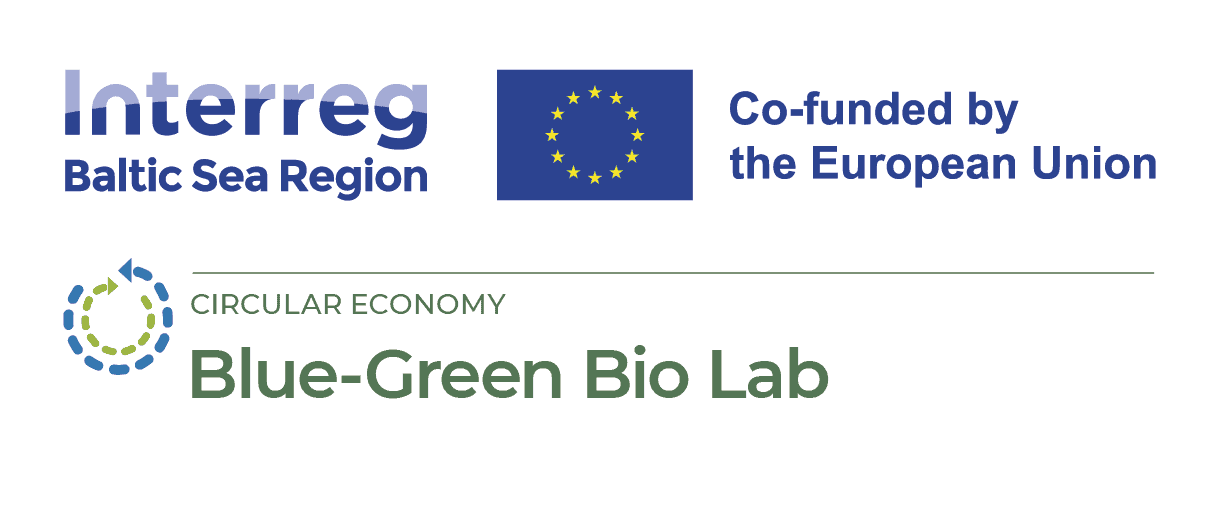
The Blue Green Bio Lab Story
14 August 2024
The story behind the Blue Green Bio Lab project starts with the urgent need in the Baltic Sea Region (BSR) to promote regenerative approaches in agriculture and reduce nutrient leaching to the Baltic Sea and inland waters. These urgent and multi-sector needs coincide with the focus of many countries in the BSR to develop greater self-sufficiency for goods such as food and energy.
The Blue Green Bio Lab partners came together based on our common belief in opportunities for addressing urgent environmental and climate needs AND improving self-sufficiency through the development of new circular bio-industrial symbioses based on blue (marine) and green (agricultural) biomasses. With circular bio-industrial symbiosis one company’s residuals (previously referred to as waste products) serve as input for another company’s production.
The potential is there, so why don’t we see circular bio-industrial symbioses everywhere?
The answer is that while circular bio-industrial symbiosis makes sense in theory, its quite complicated to establish in practice. Business actors have new roles and responsibilities when it comes to realizing circular business models. Circular bio-industrial symbiosis is also a complex undertaking requiring new conversations about logistics, pricing for residuals, energy sharing potential and more. This important circular transition is further complicated by largely linear existing laws and structures that are simply not geared (yet!) for realizing the circular economy.
Contributions from the Blue Green Bio Lab project to the circular green (and blue!) transition
The partners in the Blue Green Bio Lab project are a combination of local and regional authorities and business support organizations. We have experienced first hand that public authorities have an important and new role to play in developing circular bio-industrial symbiosis in the Baltic Sea Region. Therefore the primary focus group in our project is helping our public sector colleagues in taking on this new role.
Local and regional authorities (depending on the country) are responsible for a range of tasks in the establishment of new businesses such as approving local development plans, doing environmental impact assessments and carrying out monitoring activities. However with circular bio-industrial symbiosis these local authorities can also have other roles in facilitating actors essential to the circular green transition.
Several of the partners have experienced that municipal or regional representatives are unsure of their role and how to communicate about the complexity involved in circular bio-industrial symbiosis in an understandable way. It is for this reason that the partners developed the Blue Green Bio Lab Toolkit. The project aims to accelerate the development of circular bio-industrial symbiosis by developing a toolkit for local public authorities about how to plan and proceed in these complex processes.
What have we done in the project?
The project is a transnational cooperation between partners in Denmark, Sweden and Latvia interested in developing circular bio-industrial symbiosis around blue and green biomasses. During the project the partners cooperated on the following activities:
1. Analysis of biomasses with symbiosis potential and positive ecosystem services. These analyses are currently available in the form of 5 climate and environmental policy briefs on the project website.
2. Local workshops using a transnational design for initiating discussions around circular bio-industrial symbiosis using the Art of Participatory Leadership methodology. National and transnational learning from the workshops are presented in a series of bio-industrial symbiosis briefs.
3. Discussions between partners, experts and policy-level actors regarding ideas gathered from stakeholder workshops about barriers, regulatory and otherwise, to circular bio-industrial symbiosis. The partners aim to identify solutions and next steps shared via a series of policy briefs.
4. Developing the Blue Green Bio Lab Toolkit to accelerate circular bio-industrial symbiosis development across the Baltic Sea Region. The toolkit contains all the policy briefs (from the 3 project activities above) and a step-by-step guide for starting discussions and tackling barriers to circular bio-industrial symbiosis development. The toolkit has and will be shared with public authorities and others to support these actors in addressing the complex challenges of facilitating the first steps on the road to circular bio-industrial symbiosis.
So now what?
We have shared the Blue Green Bio Lab toolkit widely through discussions and meetings with other local authorities as well as at our online final conference held in March 2024. We have received positive feedback about the toolkit from many participants in our project and hope that they will in turn also share the learning in our toolkit with their colleagues and network. We are using the toolkit ourselves and share it actively with cooperative partners and businesses in our daily work with circular bio-industrial symbiosis.
This 18-month small scale project has been made possible thanks to the support of Interreg Baltic Sea Region. We feel we have learned a lot in the project and catalyzed this learning in an understandable way in the Blue Green Bio Lab Toolkit. Through the financing and support from Interreg BSR we have been able to share information further than we could have done on our own, which has been a great help.





